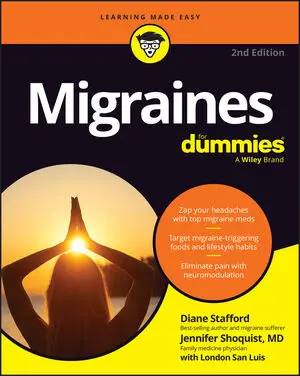A rebound headache is a headache that you end up with just because you go in search of a little relief from the constant pounding in your noggin. You feel bad, so you take a pill — you feel worse, so you take another, and so on, and so on, and scoobie-doobie-do. Basically, you wind up with a headache because you're overusing medications.
Exceeding label or physician instructions when taking medications can result in rebounding into another headache. Other spin-offs of medication overuse include a more excruciatingly painful headache, addiction to medications, and other adverse side effects. Prolonged use of even over-the-counter medicines can cause liver and kidney damage.
In the wild-and-woolly migraine arena, rebound headaches have to rank right up there at the top of the pain-wielding, mind-blowing, frustration-inciting extravaganza. Sometimes rebound headaches are migraines, and sometimes they're not.
To help prevent future rebound headaches, you may be able to take a migraine-preventive medication or use lifestyle changes without medication. First, however, you must get past the vicious cycle of rebounding — you overmedicate repeatedly before realizing that you're perpetuating your pain. Your doctor can help you taper off your overmedicating, nonproductive ways.
If some of the following signs apply to you, you're probably having rebound headaches (but be sure to see your doctor for evaluation of your problem to confirm that it's a headache and not something more serious):
- You suffer from headaches daily or every other day.
- Your pain intensifies about three hours after your last dose of medication.
- Your pain medications don't work as well as they used to.
- You take more medication, but your headaches are worse.
- You rely on more pills, and you take them more often.
- You take medication even for mild headaches, and you often try to ward off a headache by using a medication.
- You take pain relievers three to four days a week, and you average more than three tablets per day. (This depends on the kind of medication you're taking, so you'll need your doctor's advice.)
- Your pain runs the gamut from mild to moderate to horrible. Usually, the pain is a dull ache that you feel on both sides of your forehead and, sometimes, on the top or back of your head.
- Your headaches occur much more frequently.
Because you're in pain, you may use medications too often. The theory behind the rebound headache is that the overuse of drugs makes the headache rebound after your body has absorbed all of the medication. Painkillers are supposed to relieve pain, of course, but if you overuse prescription or nonprescription drugs, they can turn on you and actually cause headaches.
Essentially, an over-the-counter drug or a prescription medication that's taken too often can give rise to a brain-craving for more of the medicine. The episode begins when the brain gets some initial relief from pain, likes the effect, and then decides it will send out to room service for more of the same. Your brain continues to signal "pain" in its search for more of the drug, and you have to take increasing dosages to get relief. Therefore, your medication becomes less and less effective, and you create a cycle of increasing misery.
If you rush to the emergency room with a killer migraine, the doctor will want to know what you took and when you took it last, so be prepared to supply this information. The emergency room physician needs to know if you overused medication and have a rebound headache. She doesn't want to treat you with a medication you overused, or with a medication that's not going to jibe with a drug you took recently.
The typical medications that appear in the rebound scenario are aspirin and acetaminophen, alone or in combination with caffeine-containing products. Other drug culprits often implicated in rebounding are
- Caffeine
- Codeine
- Combination drugs such as Fiorinal and Midrin
- Drugs containing barbiturates
- Ergotamine tartrate
- Opiates
Abortive drugs (such as the nonsteroidals ibuprofen and naproxen), triptans (Imitrex, Zomig, Amerge), and DHE (dihydroergotamine) may also induce rebounding, but they're less likely to do so.





